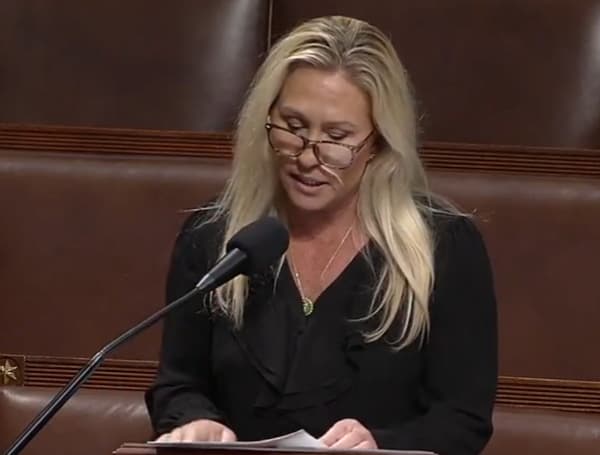A sweeping Republican-backed reconciliation bill, dubbed the “One Big Beautiful Bill” (OBBB), is facing a significant backlash across the political spectrum, with Georgia Rep. Marjorie Taylor Greene (MTG) expressing regret over her vote and tech mogul Elon Musk unleashing a scathing critique of its fiscal implications.
The legislation, which includes a controversial provision preventing states from regulating artificial intelligence for a decade, now heads to the Senate, where its future remains uncertain.
MTG took to X on Tuesday to voice her strong opposition to the AI provision, stating she was “adamantly OPPOSED to this and it is a violation of state rights.” RELATED: Elon Musk vs. Mike Johnson: “Beautiful Bill” Or “Disgusting Abomination”?
She asserted that had she known of its inclusion, she would have voted no, and vowed to oppose the OBBB if the provision remains after Senate changes.
Greene’s belated opposition has been welcomed by some Senate Republicans, including Sen. Josh Hawley (R-MO), who is actively working to kill the measure in the upper chamber.
The AI provision, which aims to establish national standards for AI policy by preventing states from enacting new regulations for the next ten years, has its proponents.
READ: New Jersey Sen. Cory Booker Blows His Lid During Fiery Exchange With Texas Sen. Ted Cruz
Sen. Mike Rounds (R-SD), a supporter, argued that a national policy is crucial for AI, as state-by-state regulations would be unworkable. Sen. Bernie Moreno (R-OH) and Sen. Ted Cruz (R-TX) also back the measure, with Cruz calling it “a terrific policy.”
However, the provision faces a significant hurdle in the Senate: the Byrd Rule.
This rule limits reconciliation bills strictly to budgetary policy, and several lawmakers believe the AI measure may not survive a challenge under these rules. A decision from the Senate parliamentarian on this matter could come as early as next week.
Meanwhile, the OBBB’s broader financial scope has drawn the fiery condemnation of Elon Musk. The former head of DOGE, in a series of social media posts, labeled the bill a “disgusting abomination” that would cripple the nation with unsustainable debt.
Musk decried the package as “massive, outrageous, pork-filled” and warned it “will massively increase the already gigantic budget deficit to $2.5 trillion (!!!) and burden America[n] citizens with crushingly unsustainable debt.”
READ: Paxton Holds Massive Lead Over Cornyn In Early Texas Senate Primary Poll
In stark contrast to Musk’s outrage, JP Morgan CEO and Chairman Jamie Dimon has been a vocal advocate for the bill, urging Senate Republicans to pass it.
Dimon expressed his “thrill” at the House’s passage of the package, which extends expiring provisions of Trump’s 2017 tax cuts and allocates over $100 billion for border security. He argued that consistent tax rates are vital for business investment and economic growth, suggesting deficit concerns could be addressed by increasing efficiency in federal programs like Medicare and Social Security after the bill’s passage.
The “One Big Beautiful Bill” narrowly passed the House with a vote of 215-214-1, with some Republican dissent. Reps. Thomas Massie (R-KY) and Warren Davidson (R-OH) voted against the measure due to deficit concerns, and House Freedom Caucus Chairman Andy Harris (R-MD) voted “present.”
White House press secretary Karoline Leavitt indicated on May 22 that President Donald Trump, a strong proponent of the bill, intends to primary both Massie and Davidson for their opposition.
Despite President Trump’s push, several Senate Republicans have voiced significant apprehension and are threatening major changes to the bill. Senators Ron Johnson (R-WI), Rand Paul (R-KY), Rick Scott (R-FL), and Mike Lee (R-UT) have all come out against the legislation in its current form, primarily citing excessive government spending.
Senator Paul has indicated he would likely support the bill if a provision raising the debt ceiling were removed. Senator Johnson believes there are enough GOP members to halt the bill until spending reduction and deficit concerns are addressed, emphasizing the need to reset spending to pre-pandemic levels.
As the OBBB moves to the Senate, it faces a gauntlet of challenges, from procedural hurdles to deep divisions within the Republican party, making its ultimate fate uncertain. Sources
Please make a small donation to the Tampa Free Press to help sustain independent journalism. Your contribution enables us to continue delivering high-quality, local, and national news coverage.
Connect with us: Follow the Tampa Free Press on Facebook and Twitter for breaking news and updates.
Sign up: Subscribe to our free newsletter for a curated selection of top stories delivered straight to your inbox.

